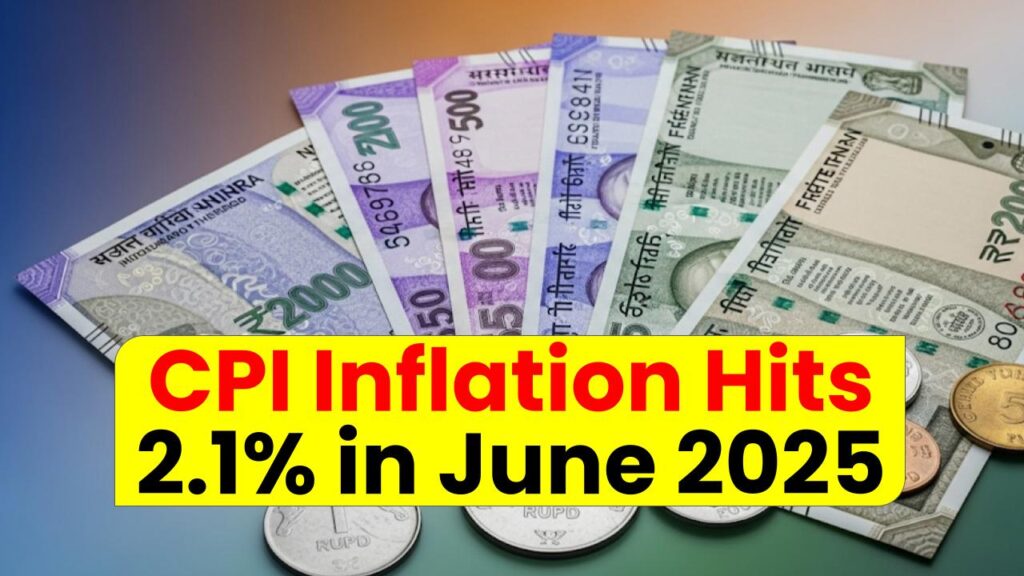Inflation has always been a hot topic in the financial world, and right now, everyone is talking about the latest news: CPI inflation has dropped to 2.1% in June 2025, the lowest level since January 2019. But what does this mean for you, whether you’re a homeowner, a business owner, or just someone looking to keep your finances in check? This article will break it all down for you.

CPI Inflation Hits 2.1% in June 2025
| Key Point | Details |
|---|---|
| Current Inflation Rate | 2.1% in June 2025, the lowest since January 2019 |
| Impact on Food Prices | Consumer food price index (CFPI) turns negative at -1.06% |
| Impact on Housing | Lower inflation may slow down rising housing prices |
| Possible Interest Rate Cuts | The Reserve Bank of India (RBI) could further cut interest rates |
| Consumer Spending | Lower inflation increases purchasing power, stimulating the economy |
| Stock Market Sentiment | Positive investor outlook due to eased inflation and stronger markets |
In conclusion, a 2.1% CPI inflation rate in June 2025 marks a turning point in India’s economic landscape. With lower food prices, the potential for interest rate cuts, and increased purchasing power, this could be a time of opportunity for consumers, business owners, and investors alike.
While inflation might feel like an abstract concept at times, its effects are felt every day, from the price of groceries to your monthly mortgage payment. Keeping an eye on inflation helps you make smarter decisions about everything from savings to spending.
What is CPI Inflation and Why Does it Matter?
Before we dive into the details, let’s start by understanding what CPI inflation is. CPI stands for the Consumer Price Index, and it measures the average change in the prices of a basket of goods and services over time. This includes everything from the food you eat, the clothes you buy, to the rent you pay. When inflation goes up, it means things are getting more expensive. When it goes down, like now, it means things are getting relatively cheaper. Now, a 2.1% inflation rate might sound pretty low, but how does it impact you? Let’s break it down.
Why Did Inflation Drop?
The drop in inflation can largely be attributed to food prices. According to the Consumer Food Price Index (CFPI), food prices have actually turned negative, with an inflation rate of -1.06% in June 2025. This means that the average price of food has dropped, easing the financial burden on consumers.
This decrease in food prices is linked to factors such as:
- Good Weather: Favorable monsoon conditions in key farming regions led to a bumper crop season.
- Government Policies: The government has been implementing measures to stabilize food prices, including reducing import tariffs on essential food items.
- Global Supply Chains: International food supply chains have recovered, which has helped lower prices.
How Does This Impact You?
Lower Cost of Living
A reduction in inflation means that your money will stretch further. For example, if you were paying $100 for groceries last year, you may now be paying only $98 due to lower food prices. For families, this means more money in the pocket that can be spent on other things, like education or leisure.
Potential for Lower Interest Rates
With inflation on the decline, there’s a good chance that the Reserve Bank of India (RBI) will cut interest rates. For those with loans, this could be a game-changer. Mortgage rates, car loans, and personal loans might become more affordable. If you’re considering taking out a loan, this could be the perfect time.
For example, if your loan interest rate drops by just 0.5%, your monthly payments will be noticeably lower, putting more cash in your pocket each month. Check out the RBI’s official page for updates on any changes in monetary policy.
Enhanced Purchasing Power
As inflation eases, wages often go up in real terms (meaning that your paycheck buys more than it did before). With less pressure on prices, purchasing power increases, which can lead to higher consumer spending. This, in turn, stimulates economic growth, making this a good time for business owners and investors alike.
The Impact on Housing
If you’ve been following the housing market, you may have noticed that inflation has been pushing up prices for quite some time. However, with inflation now at a low of 2.1%, real estate prices may stabilize. If you’re in the market for a house, this could mean a slower rate of increase in property prices, or even a slight dip in some areas.
Lower inflation also suggests that people are spending more cautiously, which can slow the housing boom. That’s great news for first-time homebuyers who may have been struggling to keep up with rising costs.
Stock Market Sentiment
Lower inflation tends to be a positive sign for the stock market. As consumers’ purchasing power increases and businesses benefit from lower costs, the market generally responds favorably. If you’re an investor, this could present an opportunity to benefit from stronger market performance.
As inflation drops, investors often see it as a sign that the economy is in a good spot, potentially boosting stock prices. It’s also possible that companies in certain sectors, such as retail and real estate, may see a growth in profits due to reduced costs.
FAQs
1. Why does food inflation matter?
Food inflation directly affects the budget of every household. When food prices rise, it means families spend more on everyday necessities, leaving them with less disposable income. Conversely, when food prices drop, it frees up money that can be used elsewhere.
2. How does low inflation affect my salary?
Low inflation means that your salary will go further, as the cost of living doesn’t rise as quickly. If your income stays the same but prices drop, you can afford more with the same amount of money, which is a huge win for your personal finances.
3. Is it a good time to buy a house with inflation so low?
Now could be a good time if you’re considering buying a house. While interest rates may not fall drastically, a low inflation environment means that property price increases will likely slow down, making it easier for you to find an affordable home.
4. Will the Reserve Bank of India (RBI) cut interest rates further?
While there is speculation that the RBI may cut interest rates to boost economic activity, it’s important to stay informed through official channels. Keep an eye on the RBI’s website for updates on any changes to interest rates.
5. How does inflation impact the stock market?
Inflation has a significant impact on the stock market. Lower inflation tends to increase investor confidence, which can result in a positive market performance. Lower inflation means that businesses may face fewer cost pressures, leading to higher profit margins and potentially higher stock prices.








